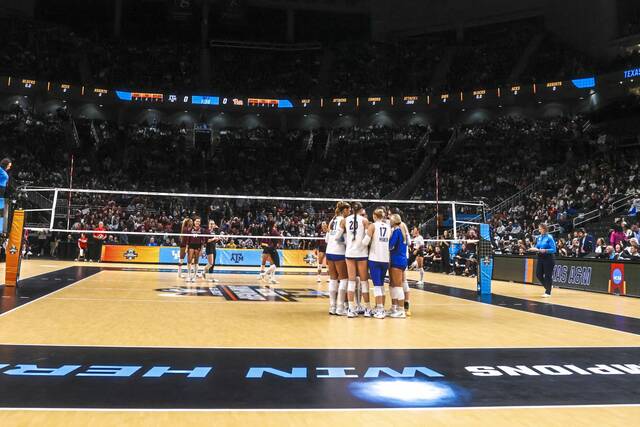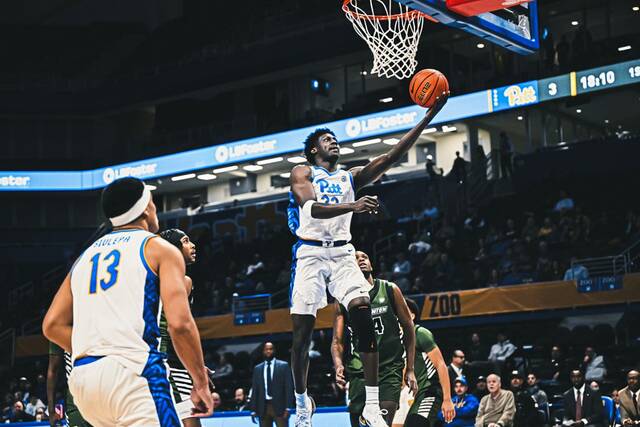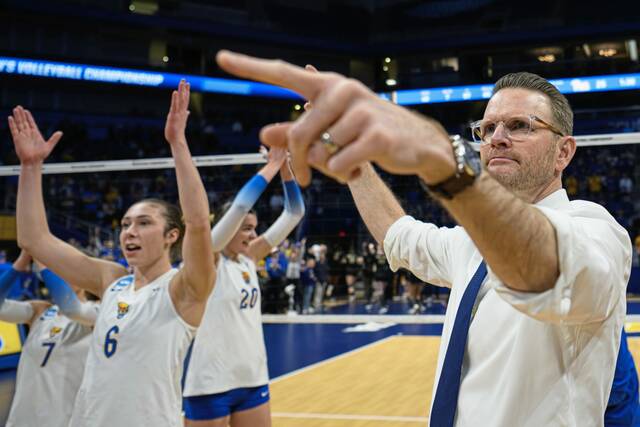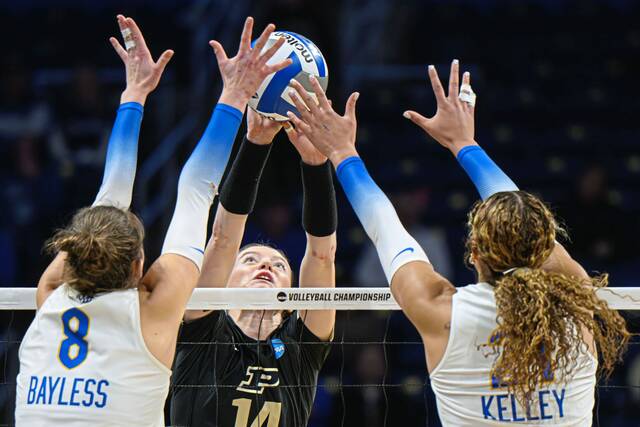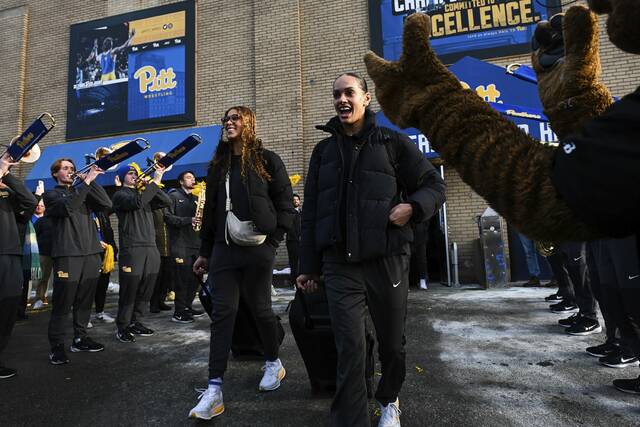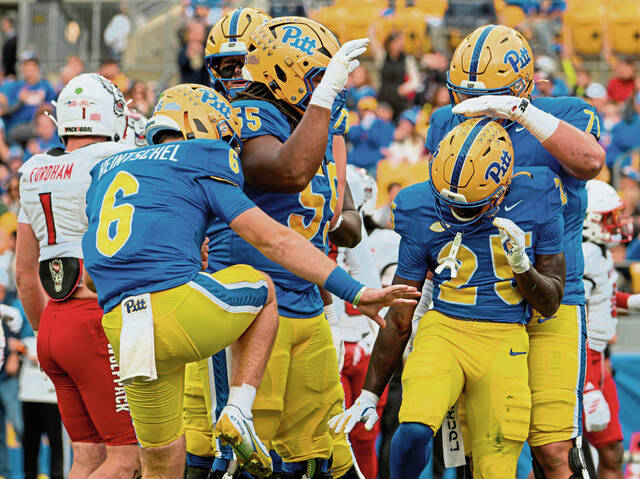For Pitt defensive lineman Dayon Hayes, it was a simple community outreach trip. Going to a hospital with a few posters to sign. Hand out a few tickets to the patients. Thank a few of the nurses on duty.
As a person who mashes their body at top speed against 300-pound ACC offensive linemen, “fear” is a concept that probably has a pretty high threshold.
So you can imagine the anxiety that he must’ve been feeling to admit some fear at the thought of simply walking into the Hillman Cancer Center that day.
What’s to be afraid of? What could be unnerving about that?
“I was kind of nervous,” Hayes said. “Even though I was doing it to help, I didn’t want to mess up. I didn’t want to say the wrong thing. I was nervous because my uncle had cancer, and I just always didn’t really know how to handle it.”
What intimidated Hayes were the memories. The reminders of how frail his uncle looked by the end of his battle with leukemia. How quickly his disease spread after the diagnosis. The toll it took on his family as they tried to aid him through the fight.
“That’s why I was so nervous going into the Hillman Center. It was so scary, because it was like I was just talking to him, and then a few months later he passed away,” Hayes recalled. “It was just so fast. It shocked me. It hurt my soul.”
For Hayes, Larry Segers was a father figure. His cousins, Segers’ sons — Marcus and Velle — were like his older brothers. Segers was Hayes’ uncle on his mother’s (Nevada) side.
“My uncle Larry and his sons put me on to football,” Hayes said. “They motivated me to play football. How he coached his sons. He took his sons to practice every day. He did everything for them. And he used to help me, too. After practice, we used to go over stuff. … He really gave me that, ‘You’re the guy. You can be the guy.’ He really enforced it on me and just helped me prep myself to where I’m at now.”
That relationship, though, went well beyond football.
More sports
• Pitt notebook: Pat Narduzzi calls sign-stealing in college football 'crappy sportsmanship'
• T.J. Watt added to Steelers injury report
• Najee Harris used bye break to watch film in attempt to improve Steelers running game
“My practices were right down the street. They always used to cook for me after practice. I always wanted to stay the night. We used to hang out and chill. We used to watch movies,” Hayes explained. “They basically helped fill that void at home without having a father figure.”
So when Segers got word of his illness, the news hit hard, especially since the diagnosis came late in the process.
“He was one of the good ones. When he got cancer, it really hurt.” Hayes’ aunt, Twanda Carter, said. “Because he was gone (about) a year after he got cancer. … It just spread so fast. There was just nothing we could do. He fought and he fought. But he was so frail, and he was just so tired. He just went to sleep one day and never woke up again. I got the phone call in the middle of the night.”
Carter and Segers were together for 27 years before a separation a few years prior his diagnosis. He spent the latter stages of his treatment going between Erie and Shadyside, with his son Marcus making frequent trips up north to help, and Twanda lending emotional support in Pittsburgh.
“We stayed really close. We’d talk on the phone every other day. When he’d come here, I would go see him at the hospital, or he would come (to her home) and sit and have coffee and we’d talk,” Carter said.
Segers, who had served with the Marines, passed away at age 67 on Jan. 27, 2022. With that in mind, Hayes was leery about stepping foot into the Hillman. But when he did, what he saw changed his perspective.
“Walking out I felt like I made a difference in a way where I brought some energy, some spirit,” Hayes said. “I felt like I made their day in a way. Any new face, any bright smile. People don’t realize just how much visiting people there — them seeing you smile — it just helps them. Them seeing you laugh. Seeing people care. I just took from it. … I helped.”
Those personal interactions changed Hayes’ outlook. Why be bullied by the images of what cancer had done to his uncle? Why not use the positive images of the patients’ faces as motivation to do something good?
Hayes approached Celeste Welsh, Pitt’s director of community engagement and media operations. She connected Hayes with those operating the Rush to Crush Cancer initiative at UPMC Hillman. They worked with Hayes through the NCAA’s new NIL (name, image, likeness) guidelines to set up his own initiative on their platform. Now, Hayes has his own fundraising arm called Tackle Cancer. Potential donors are encouraged to pledge a flat fee or a designated dollar amount for every tackle Pitt’s defense makes this season in an effort to advance cancer research at Hillman.
Welsh says that she knew Hayes was sincere about the efforts the moment he began interacting with the patients and staff.
“He walked in with a smile on his face. Those patients don’t have many smiles on their faces while they are receiving chemo. But he took them away from their pain,” Welsh said. “He talked football with them, gave them posters, invited them to a game. … The nurses called me afterward and just said, ‘When can he come back?’ He just brought so much happiness to them that day.”
For his part, Marcus Carter-Segers said he is moved by what his cousin is doing to honor the memory of his father.
“It was something totally unexpected. It brought tears to my eyes. Tears of joy to see that (Larry) really meant something to him and that the words that my father spoke to him meant a lot to him,” Carter-Segers said. “My dad would be jumping for joy. He used to have (Hayes’) jersey in a frame hanging on the wall. He watched his games and always talked about him. My dad loved Day Day. And he knew exactly who Dayon would’ve been today. So I think he is making him proud.”
As Hayes should be of himself for taking that first step through the hospital door.




